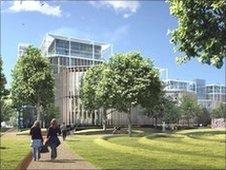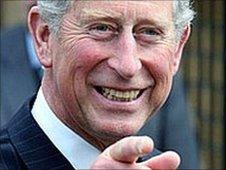Witnesses 'lied about royal role' in Chelsea Barracks
- Published

The Chelsea Barracks site was to have 552 modernist flats
Witnesses lied to cover up the involvement of Prince Charles and the Emir of Qatar in the withdrawal of a planning application, a judge was told.
The High Court heard Qatari Diar, owner of the Chelsea Barracks site in London, deleted e-mails to stop the role of the royals being presented as evidence.
Developers the Candy brothers claim the project fell through after the Prince of Wales complained to their partner.
Qatari Diar's lawyer said the allegations were "unjustified".
The plans were to build 552 modernist flats on the 12.8-acre site, which the Qatari Diar CPC consortium bought for £959m.
Qatar's prime minister Sheik Hamad bin Jasim, who is also a cousin of the Emir, is the chairman of Qatari Diar.
The case, initially heard by Mr Justice Vos last month, came back to the court following the allegations.
The judge has now called for new witness statements.
'Political decision'
Lord Grabiner QC, for Christian Candy, said the Qatari Diar would have had to pay £81m to Mr Candy's company CPC for breaching the contract if it was revealed that the application was withdrawn because of the Emir's meeting with Prince Charles.
He said executives at Qatari Diar knew all along about the Emir's involvement but had given evidence in court that the withdrawal of the planning application was triggered by other causes.
"All those witnesses lied to Your Lordship when they gave evidence," the QC said.
"They were motivated by concern to conceal what actually happened to protect Qatari Diar and the Emir to enable them to avoid paying the money under the contract.

Several e-mails had references to Prince Charles, the judge heard
"It was a political decision not permitted under the terms of the contract."
Qatari Diar employee John Ward, responsible for the project, deliberately deleted e-mails to stop the information about the Emir's involvement being disclosed in court, Lord Grabiner added.
"The deletion of documents did not come to light until CPC received third-party disclosure from the Prince of Wales.
"A number of documents disclosed by him were communications to and from Mr Ward that had not been disclosed by Qatari Diar," he said.
When the e-mails were retrieved from the firm's London server, most of them had references to Prince Charles and his private secretary, Sir Michael Peat, Lord Grabiner said.
Joe Smouha QC, for Qatari Diar, said the accusations amounted to attempting to pervert the course of justice.
"These are entirely unjustified allegations."
He added that these new documents were misinterpreted by CPC as evidence that Qatari Diar knew about the Emir's involvement.